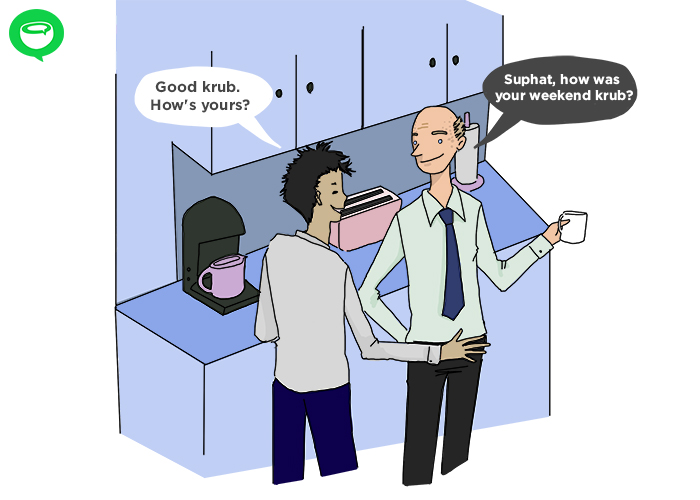One of the most endearing characteristics of Thai people is their desire to be unfailingly polite. This is why they end their Thai sentences with “ka” and “krub.” But, many people wonder why they continue to use these oh-so-Thai endings even when they speak English.
Thai children are taught to make a habit of using these polite endings from a young age. Thai women end sentences with “ka” while Thai men use “krub” as dictated by social etiquette. What’s surprising is that many Thais still feel the need to say “ka” or “krub” even when they are not speaking or writing in Thai.
“In Thai ‘krub’ and ‘ka’ are polite particles added to the end of a sentence. There is no equivalent version of them in English,” said Tirote Thongnuan, a language expert and lecturer at Kasetsart University’s Department of Foreign Languages.
There is no difference in meaning between “Thank you very much” and “Thank you very much ka,” yet, as a Thai person, I find myself writing to a senior Thai co-worker asking if she could “do an illustration for this article ka?” In the same way, I receive a business email from a Thai PR agency, saying “Thank you for your prompt response krub.”
My Thai friend Thiya, who works at a large Thai corporation, said she witnessed a Thai woman giving an impressive presentation in fluent English, yet she still couldn’t drop the “ka.”
The question becomes: Why can’t we commit to speaking full English sentences without using those magical endings? Could there be other reasons than simply trying to sound polite?
One possibility is because we think in our first language, Thai, in our heads, therefore, the need to end a sentence with “ka” never goes away.
“Because we think in conversational Thai in our heads, even when we write or speak the message in English,” Thiya, a 28-year-old who speaks fluent English, pointed out.
Tirote Thongnuan identified this phenomenon as an “L1 interference,” where speakers or writers use language forms and structures from their mother tongue when attempting to speak another language.
“The two politeness particles inserted after English sentences are caused by the L1 interference. Thai people are too worried about not sounding polite when they speak or write in English,” Tirote said.
Meanwhile, Ninee, a secretary to a Korean businesswoman, said she only uses “ka” with her boss to soften the tone of her statements.
“I’d say to her ‘Good morning, ka.’ At first, she didn’t understand, but after a while she did and thought it was cute. Then she started to use ‘ka’ too,” Ninee said.
“It’s a soft way of greeting. Just ‘good morning’ sounds blunt to me. It’s Thai style,” she added.
Besides the world of business, Thais commonly type “krub” and “ka” while texting on their phones in English. This might simply be because the English-language keyboard is much easier to type on than Thai, as many Thais agree.
“‘Krub’ and ‘ka’ are commonly used among Thais who chat on Facebook or Line using ‘karaoke language.’ They are so accustomed to it that they fail to leave the words out when they speak or write in English,” Tirote added.
However, they may adopt “ja,” or the unisex, less formal version, in conversations between friends.
Choti, 28, who admitted to texting ‘ja’ to her friends said: “I think it’s our culture. We were raised to say these words, and it became a habit since we were young. If we don’t say it to another Thai person, we feel we’re not being polite.”
“Like, if you text me ‘I’ll meet you at 10,’ I’d text back ‘Okay, ja’ instead of just ‘Okay,’ because it sounds too blunt,” she said.

On the other hand, I have found that many foreigners adopt the magic words when speaking to Thais, although this may be because they are among the few Thai words they actually know.
James, a 37-year-old Londoner, finds using “krub” with his Thai staff a term of endearment and politeness. While there is no English translation for the word, he compared them to terms such as “darling” or “sugar” in England.
“In England, we don’t have a substitution for this term, but we would very often use terms of endearment in our language,” he said.
“If I order a pint of beer in a pub from a 60-year-old woman, she will mostly likely reply ‘There you go, darling.’ But in Thai, the use of the word ‘darling’ would indicate to a Thai person that the user was trying to be affectionate or flirty. It would totally depend on how it’s said.”
In the Thai Royal Institute Dictionary, the words “ka” and “krub” are both defined as “an ending word to suggest the politeness of the message.” In my own translation, they are filler words that don’t mean anything.
Yet it is fascinating that these one-syllable words can change the tone of a speech, ease the cultural barriers between two speakers of different tongues, and appeal as unique, endearing characteristics of a culture. With that said, without any meaning at all, “ka” and “krub” may be the most powerful words in the Thai language.




